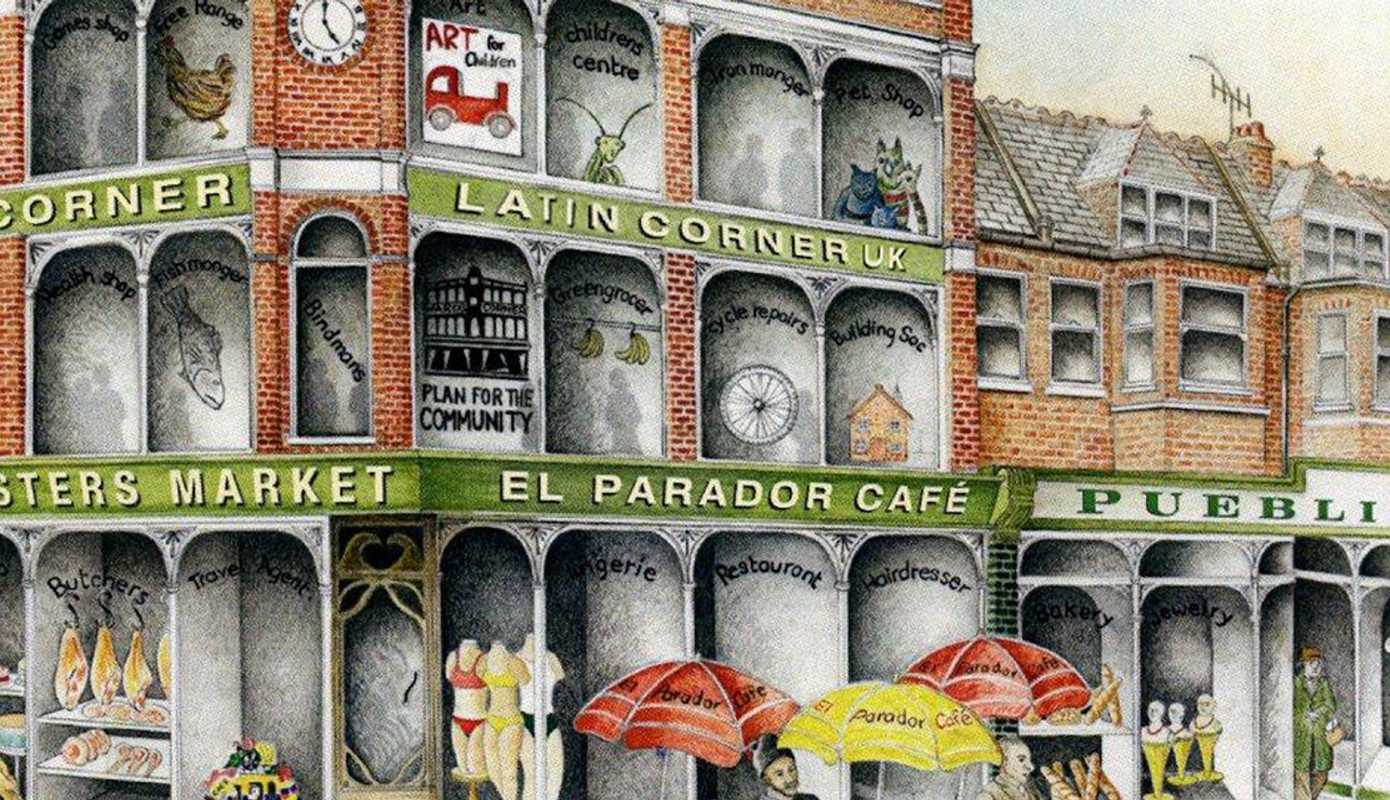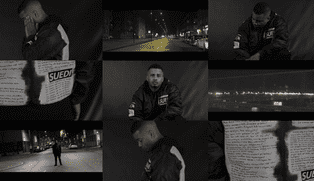Many of those reading this article will be familiar with the impact of gentrification on minority communities. Research has shown that gentrification directly contributes to the rise in economic and racial inequality seen in boroughs across London. And yet the fight to keep these communities from being lost to the cranes of multimillion pound development plans is still a reality for many across the capital.
This is the fight that El Pueblito Paisa (or The Latin Village) in Haringey has been battling for over the past year. Mirca Morera, who is the director and founder of Latin Corner UK, is one of the many advocates helping to #SaveLatinVillage from the contentious redevelopment plan affecting the Seven Sisters neighbourhood in Tottenham, where the Latin Village is located.
Latin Corner UK sprouted from its association with the Wards Corner Community Coalition (WCC), which was created to save the Seven Sisters Indoor Market as well as the Wards Corner department store. Following a compulsory order made by Haringey council’s cabinet in 2015 to redevelop the Tottenham area, the market and businesses operating within El Pueblito Paisa were told they would have to temporarily move – disrupting the livelihoods of hundreds of families and greatly impacting a whole community.
Latin Corner UK, in partnership with the London Latinxs, gathered attention in part due to their Salsa&Samba shutdowns in which people from the Latinx community come together to celebrate their culture through dance as a way to resist gentrification efforts. It serves as a representation of the culture that they are working to preserve in El Pueblito Paisa. As a result of protests like the Salsa&Samba shutdowns, Haringey Council called a public inquiry on the Compulsory Purchase Order in July this year. It gave community members the opportunity to provide feedback regardless of Haringey council’s support of the redevelopment plans. The public hearing involved multiple members from the Seven Sisters community and organisers from Latin Corner UK.
Mirca Morera and Latin Corner UK has been a pivotal voice for the Latinx community in London as it faces the threat of gentrification and has served as a vital resource for the community. This interview with Mirca Morera was done following the public hearing.
*
Sarah Zumba: What is the Latin Corner?
Mirca Morera: The name sprung from Wards Corner Coalition – a community coalition that meets every Monday. They are community groups in the area that have supported plans to restore that site to its former glory. All of that site is called Wards Corner – it’s a historical name. I wanted to create a place where I could project other peoples voices, especially the Latinx voice.
If you look at all the flags – we’ve got a village map – there are so many different nationalities, from Colombia and many Latin American countries to African countries – it’s such a cultural blend. That’s what makes the place so appealing – seeing how people can get on so well with each other. It’s not the government that’s made it harmonious. It’s down to the community itself that’s made a success of it.
SZ: I saw that on your Facebook there was A Day At Oxford where students from the community were brought to Oxford. Is that something that you helped organise?
MM: Yes! It’s funny because Latin Corner UK does the speaker’s corner and the campaigning, but then one other side is working with children. Every Monday there’s an after school club and a Saturday school. Beyond that, it’s the school trips that I help to organise. From when I was young my mother was always very busy working – life can be hard when you’re an immigrant and you’re settling down in a country, so I thought, okay, what can I do? I studied to become a teacher, I’ve gained this work experience and access in undergraduate admissions. How could I put that to good use? That’s why I organised that trip to Oxford. It’s about allowing people to have these experiences that might somehow, in the future, prove useful if they decide to make an application at university or explore higher education. It was a nightmare to organise, but I think it was worth it for both the children and the parents on the trip.
SZ: For communities that have a predominantly PoC population, the risk of social cleansing masked as ‘redevelopment’ is a serious issue. We know that you’re trying to stop this from happening in the city’s oldest Latinx community market by holding a public hearing with the Haringey council, which couldn’t have been easy considering the bureaucratic nature of redevelopment. What has the process been like in trying to get a public hearing with the council and what, ultimately, do you hope to come out of these hearings?
MM: The hearing lasted about three weeks. It was public so that people’s voices were heard. It was a lesson in Equality of Arms because on one side you’ve got the local government – Haringey council – and on the other side you’ve got our POC communities. They’ve got billions of pounds and can count on a very prestigious law firm and QCs. Whereas we’ve got no legal aid or access to funding. The fight was very unequal.
Initially when the community was served, they were served in English. I told them not many people are going to be able to understand, but the translation was done after the deadline – not a great way to start. In October 2016 I got in touch with the first Latin American lawyer practicing at the Bar of England and Wales and eventually she agreed to represent the Latin Corner and about 35 traders of the Latin Village. We managed to raise £23,000, helped by some huge donations by individuals. It was a case that was fought extremely well. I was there nearly every single day and I was very impressed. We put up a good fight.
SZ: Earlier in the summer your organisation was posting about the Grenfell Tower Fire on Facebook, as well as the importance of migrant business. As the focus of your organisation is gentrification in Latinx communities, how important is it for you to be there for other communities of colour that also face oppression and violence on a systematic level?
MM: We’ve been supported heavily by The London Latinxs and they’ve been fantastic, creating a coalition and solidarity network with groups like Black Lives Matter and Wretched of the Earth. They’ve also got a fantastic relationship with the Anti-Raids group. Recently there was a young boy who was murdered in Hackney, his name was Edson. At our events we’d have a banner up for him to show solidarity with Black Lives Matter and the Grenfell communities, to emphasise how everything is connected.
SZ: How do these ethnic enclaves, like Elephant and Castle & Seven Sisters, serve as places of transition for Latinx immigrants when they first arrive to London or the UK?
MM: Funnily enough, it’s not just Latinx people. When people are away from their country or maybe they just haven’t got a very good social network, it’s a safe place [for them] to just hang out and overcome that feeling of isolation. There’s a lot of people who are retired – they’re not Latin, they’re British – and yet they feel the warmth and welcome of our community, so they hang out in the Latin Village and do all the things that people would typically do in a pueblo or village. That’s what makes the Latin Village so magical. It’s somewhere where people can just hang out, enjoy the company and culture, and you don’t have to have a lot of money.
The Latin American community are characterised as being very hard–working and working long hours. When parents from the Latin Village are at work, they’re children are able to hang out in the Village, everybody looks after them and they have a fantastic time. They’re growing up in this environment where everybody knows them, everybody’s taking part in their childcare and providing them with a community.
Our barrister actually made the case about the children – how important this place was because it’s not just a resource for the parents, it’s the source of their children’s happiness. That’s the service it really gives to the migrant community in London.
SZ: I saw that the United Nations released a statement about the issue on July 27th 2017, stating that the people conducting this regeneration need to consider the human rights violations they could be committing by continuing on with the project without communicating with the community. How do you think this is going to affect your movement?
MM: I went to the UN in February this year and I was really surprised when I met with them. I met the team with the special rapporteur for ‘minority issues.’ I wasn’t very familiar with the term ‘gentrification’ but the UN used it so I thought if they are aware of the harmful effects of gentrification, it should be a perfectly acceptable term to use in everyday language when we talk about the difficulties communities are facing.
I don’t know what this will mean for the future of the movement. When the UN statement was released just before the hearing finished, the inspector was able to consider it when making his judgement. I was thrilled because the United Nations actually intervened in a way that made a difference for communities such as ours. I don’t know what kind of precedent it’s going to set.
SZ: What are your hopes for Latin Corner UK in the future?
MM: Well I always had a dream that somehow the Latin American community in London, and maybe even the UK, could have this kind of unity with the Latin American community in the United States. I know that we have a very strong presence in the US, but wouldn’t it be great if somehow we created an international solidarity network? I remember when Trump was elected I felt enraged, but everybody in the UK had this huge solidarity with our brothers and sisters in the United States. Politicians, the media, everyone needs to realise this is an international community. This is a very strong community and it’s important to tread carefully because it’s a united community.




